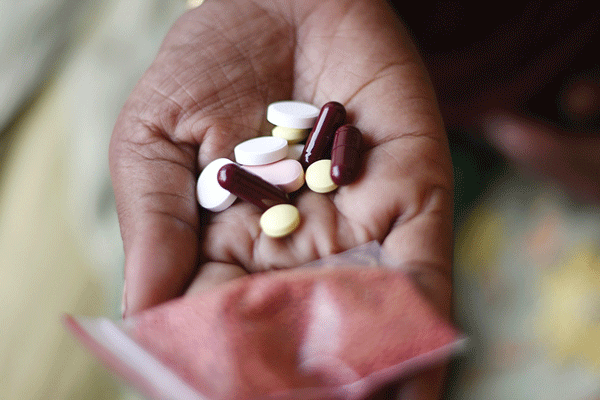
KAROI — The long journey travelled by 42-year-old Shamiso Mudoka in the fight against tuberculosis is a typical case that calls for the scaling up of the fight against the disease.
BY NHAU MANGIRAZI
Her sorry tale highlights the importance of awareness among TB patients and the community at large.
Soon after she was diagnosed, Mudoka discovered that she was about to travel a long journey to defeat the scourge.
She had nowhere to stay, after her brother evicted her from their family home.
Although her electrifying smile greets any visitor in Karoi’s oldest high-density suburb of Chikangwe, the battle she went through in the last seven years is still fresh in her mind.
A single mother of two children, aged eight and 11, Mudoka has somehow managed to overcome the social outcast jacket she wore for several years and also the disease.
- Chamisa under fire over US$120K donation
- Mavhunga puts DeMbare into Chibuku quarterfinals
- Pension funds bet on Cabora Bassa oilfields
- Councils defy govt fire tender directive
Keep Reading
“It all started in early October 2010 when I developed cold fever,” she recalled.
“I went to the hospital and was given amoxicillin drugs. The doctor recommended that I must have my sputum tested.”
It took some time before Mudoka could get results and the feedback that she was to undergo TB treatment.
All hell broke loose as she could no longer afford to fend for herself because of the burden brought by the disease.
“I had to move to our family house, but my brother, Stephen, could not accept me,” Mudoka says.
Her neighbour, Ambuya Jennifer Mapanga, says Mudoka was a social outcast after her brother evicted her.
“We were touched by Mudoka’s plight after eviction. She was a social outcast,” she said.
Without anyone to turn to for solace and shelter, Mudoka went to Karoi General Hospital, where officials understood her plight and accommodated her.
“For six months, my brother never visited me, but I used to get regular visits from other friends,” she says. “But eventually, I fought through and won the battle with the help of strangers.”
Mudoka’s plight aptly explains how TB should be treated as a cause of concern by both the government and co-operating partners.
HIV and Aids advocate Muchanyara Mukamuri notes that TB patients face more pronounced stigma, compared to other patients, making it a barrier to accessing treatment and adherence.
“Stigma must be fought from all angles, starting at family level, health care givers and the community at large. Awareness must be included with easy-to-read materials in vernacular,” Mukamuri says.
“Political commitment and will must be reflected in costing it through the health budgets allocation. As long as the health budget continues to be as it is, we may make as much noise as possible, but we may not achieve any tangible results.”
The Global TB Report 2016 lists Zimbabwe as among the 30 high burdened countries, with a triple burden of TB, TB-HIV and MDR-TB.
The other countries on the list are Angola, Bangladesh, Cambodia, Central African Republic, China, Congo, the Democratic People’s Republic of Korea, the Democratic Republic of Congo, Ethiopia, India, Indonesia, Kenya, Lesotho, Liberia, Mozambique, Myanmar, Namibia, Nigeria, Pakistan, Papua New Guinea, Philippines, Russian Federation, Sierra Leone, South Africa, Thailand, Tanzania, Vietnam and Zambia.
“The 30 high TB burden countries accounted for 87% of all estimated incident cases worldwide,” the report reads in part.
“The six countries that stood out as having the largest number of incident cases in 2015 were (in descending order) India, Indonesia, China, Nigeria, Pakistan and South Africa (combined, 60% of the global total).
“Of these, China, India and Indonesia alone accounted for 45% of global cases in 2015. The annual number of incident TB cases relative to population size (the incidence rate) varied widely among countries in 2015, from under 10 per 100 000 population in most high-income countries to 150–300 in most of the 30 high TB burden countries.”
TB has attracted the attention of Parliament. The Parliamentary Portfolio Committee on Health in February 2016 produced a report painting a gloomy situation with regards to the disease.
While TB treatment for six to nine months costs $31, it was discovered that MDR-TB treatment for 20 to 24 months goes for $2 571.
The situation is worse for another TB strain called Extensively Drug Resistant-TB costing $31 000 to treat for 24 to 36 months.
“In this regard, with the economic strains facing the country, prevention and control of the disease becomes key to TB management in the country,” the legislators noted in their report.
They recommended government moves swiftly and reduces the exorbitant costs of the second line TB treatment.
Aids/TB Programmes (National TB Control) in the Health and Child Care ministry, Charles Sandy, says TB eradication is now a success story through community involvement.
“The programme on TB has been very successfully because we have rapidly decentralised diagnosis, care and treatment to the district level and successfully adopted a community based approach,” he says.
The Union through Challenge TB, a USAid funding mechanism continues to provide highly qualified specialist TB staff, managerial and leadership support, materials including equipment such machines and financial support to the TB programme.
The Union director, Christopher Zishiri, says they are working with the National TB Control Programme to strengthen TB control in Zimbabwe in the last nine years.
“Current interventions include enhancing access to quality patient centred care for TB, TB/HIV and MDR-TB services; prevention of transmission and disease progression through active case finding; and strengthening TB platforms including political commitment to end TB,” he says, adding that although funding is always not enough, financial challenges always hinder the provision of adequate services, the Union has, however, helped in lessening the financial burden in the TB programme.
Mudoka, free from the disease, had to go through what she termed “hell”, especially after her rejection by relatives because she had contracted the disease.












